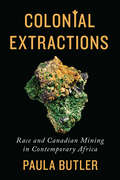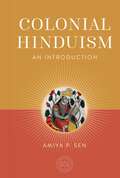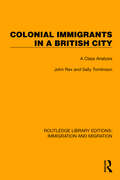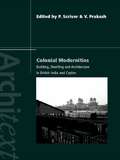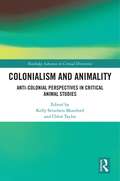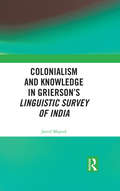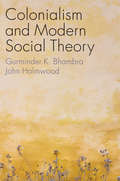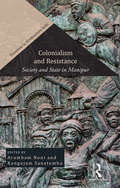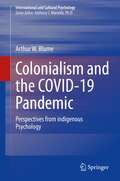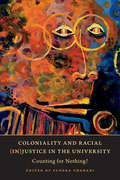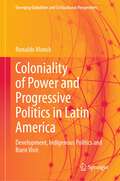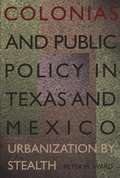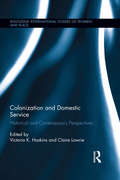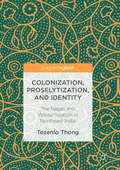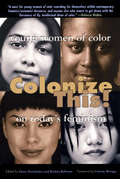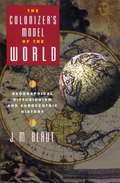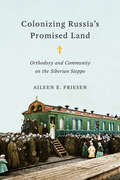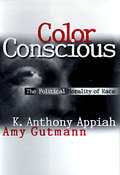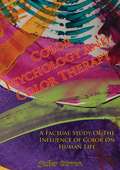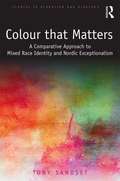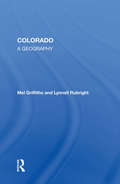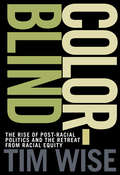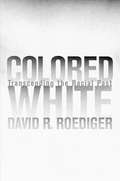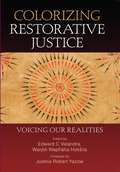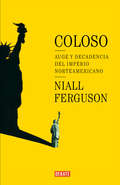- Table View
- List View
Colonial Extractions
by Paula ButlerChallenging Canada's image as a humane, enlightened global actor, Colonial Extractions examines the troubling racial logic that underpins Canadian mining operations in several African countries. Drawing on colonial, postcolonial, and critical race theory, Paula Butler investigates Canadian mining activities and the discourses which serve to legitimate this work.Through a series of interviews with senior personnel of businesses with mining operations in Africa, Butler identifies a continuation of the same colonialist mindset that saw resource ownership and racial dominance over Indigenous peoples in Canada as part of Canada's nation-building project. Financially, culturally, and psychologically, Canadians are invested in extracting resource-based wealth in the Global South, and - as Butler's analysis of Canada's influence over South Africa's first post-apartheid mining legislation shows - they look to legitimize that extraction through neoliberal legal frameworks and a powerful national myth of benevolence.Complementing analyses of the industry through political economy or critical development studies, Colonial Extractions is a powerful and unsettling critique of the cultural dimension of Canada's mining industry overseas.
Colonial Hinduism: An Introduction (The Oxford Centre for Hindu Studies Mandala Publishing Series)
by Amiya P. SenIn a tightly woven narrative, historian of modern India Amiya P. Sen traces the shifting self-understanding of Hindus in the light of the many challenges posed by the British colonial encounter, offering an accessible yet analytically rich book on the birth and development of modern Hinduism, which will be of interest to students and the interested general reader alike.Change has been endemic to Hindu cultural life from its inception. It was nevertheless in the modern era, with the advent of British colonial rule in India, that this change had its most far-reaching consequences, profoundly shaping the landscape of Hinduism as we encounter it today. In Colonial Hinduism: An Introduction, Amiya P. Sen charts this many-layered historical process in a refreshingly accessible narrative. Over seven chapters, this book traces the shifting self-understanding of the Hindus in the light of new challenges posed by the West. This encounter brought forth a new Hindu consciousness that was prepared to critique India&’s perceived past irrationalities and superstitions but also reject what it took to be the excesses of the materialistic West. Over the years, a surging Hindu nationalism and anti-colonial sentiment sought to counter the material advances of the West with the self-acclaimed spiritual excellence of India in order to to secure for India a rightful place within global civilisation. In time, however, Hindu nationalism produced its own excesses, the ramifications of which India is still contending. Colonial Hinduism: An Introduction fulfils the long standing need for an accessible yet analytically rich book on the birth and development of modern Hinduism, which will be of interest to students and the interested general reader alike. OXFORD CENTRE SERIES: The Oxford Centre for Hindu Studies Publishing Series offers authoritative yet accessible introductions to a wide range of subjects in Hindu Studies. Each book in the series aims to present its subject matter in a form that is engaging and readily comprehensible to persons of all backgrounds – academic or otherwise – without compromising scholarly rigour. The series thus bridges the divide between academic and popular writing by preserving and utilising the best elements of both. Other books in the series include The Bhagavad Gita: A New Translation and Study Guide; The Hindu Temple and Its Sacred Landscape; and Women in the Hindu World. EXPERT AUTHOR: Amiya P. Sen, PhD, is a historian with an interest in the intellectual and cultural history of modern India. Sen has been Agatha Harrison Fellow at the University of Oxford, Shivdasani Fellow at the Oxford Centre for Hindu Studies, Heinrich Zimmer Chair at the University of Heidelberg, and Fellow at the Indian Institute of Advanced Study, Shimla, and the Nehru Memorial Museum & Library, New Delhi, He has served the Universities of Delhi, Visva Bharati, Santiniketan, and Jamia Millia Islamia, New Delhi. EDUCATION AID: With the integration of discussion questions, suggested further reading, glossary of terms, and images throughout, this book serves as a comprehensive resource for both classwork and independent study of modern Hinduism.
Colonial Immigrants in a British City: A Class Analysis (Routledge Library Editions: Immigration and Migration #5)
by Sally Tomlinson Peter Ratcliffe John Rex David HearndenColonial Immigrants in a British City (1979) analyses the relationship between West Indian and Asian immigrants and the class structure of a British city. Based on a four-year research project in the Handsworth area of Birmingham, the book is a study of race and community relations – political, social, economic and personal – in a major centre of immigrant settlement. It considers the relationship between housing class and class formations and consciousness in other sectors of allocation, such as employment and education. It includes a consideration of the changing political climate on race relations between 1950 and 1976.
Colonial Modernities: Building, Dwelling and Architecture in British India and Ceylon (Architext)
by Vikramaditya Prakash Peter ScriverA carefully crafted selection of essays from international experts, this book explores the effect of colonial architecture and space on the societies involved – both the colonizer and the colonized. Focusing on British India and Ceylon, the essays explore the discursive tensions between the various different scales and dimensions of such 'empire-building' practices and constructions. Providing a thorough exploration of these tensions, Colonial Modernities challenges the traditional literature on the architecture and infrastructure of the former European empires, not least that of the British Indian 'Raj'. Illustrated with seventy-five halftone images, it is a fascinating and thoroughly grounded exposition of the societal impact of colonial architecture and engineering.
Colonialism and Animality: Anti-Colonial Perspectives in Critical Animal Studies (Routledge Advances in Critical Diversities)
by Chloë Taylor Kelly Struthers MontfordThe fields of settler colonial, decolonial, and postcolonial studies, as well as Critical Animal Studies are growing rapidly, but how do the implications of these endeavours intersect? Colonialism and Animality: Anti-Colonial Perspectives in Critical Animal Studies explores some of the ways that the oppression of Indigenous persons and more-than-human animals are interconnected. Composed of 12 chapters by an international team of specialists plus a Foreword by Dinesh Wadiwel, the book is divided into four themes: Tensions and Alliances between Animal and Decolonial Activisms Revisiting the Stereotypes of Indigenous Peoples’ Relationships with Animals Cultural Perspectives Colonialism, Animals, and the Law This book will be of interest to undergraduate and postgraduate students, activists, as well as postdoctoral scholars, working in the areas of Critical Animal Studies, Native Studies, postcolonial and critical race studies, with particular chapters being of interest to scholars and students in other fields, such as Cultural Studies, Animal Law and Critical Criminology.
Colonialism and Knowledge in Grierson’s Linguistic Survey of India
by Javed MajeedThis book is the first detailed examination of George Abraham Grierson’s Linguistic Survey of India, one of the most complete sources on South Asian languages. It shows that the Survey was characterised by a composite and collaborative mode of producing knowledge, which undermines any clear distinctions between European orientalists and colonised Indians in British India. Its authority lay more in its stress on the provisional nature of its findings, an emphasis on the approximate nature of its results, and a strong sense of its own shortcomings and inadequacies, rather than in any expression of mastery over India’s languages. The book argues that the Survey brings to light a different kind of colonial knowledge, whose relationship to power was much more ambiguous than has hitherto been assumed for colonial projects in modern India. It also highlights the contribution of Indians to the creation of colonial knowledge about South Asia as a linguistic region. Indians were important collaborators and participants in the Survey, and they helped to create the monumental knowledge of India as a linguistic region which is embodied in the Survey. This volume, like its companion volume Nation and Region in Grierson’s Linguistic Survey of India, will be a great resource for scholars and researchers of linguistics, language and literature, history, political studies, cultural studies and South Asian studies.
Colonialism and Modern Social Theory
by John Holmwood Gurminder K. BhambraModern society emerged in the context of European colonialism and empire. So, too, did a distinctively modern social theory, laying the basis for most social theorising ever since. Yet colonialism and empire are absent from the conceptual understandings of modern society, which are organised instead around ideas of nation state and capitalist economy. Gurminder K. Bhambra and John Holmwood address this absence by examining the role of colonialism in the development of modern society and the legacies it has bequeathed. Beginning with a consideration of the role of colonialism and empire in the formation of social theory from Hobbes to Hegel, the authors go on to focus on the work of Tocqueville, Marx, Weber, Durkheim and Du Bois. As well as unpicking critical omissions and misrepresentations, the chapters discuss the places where colonialism is acknowledged and discussed – albeit inadequately – by these founding figures; and we come to see what this fresh rereading has to offer and why it matters. This inspiring and insightful book argues for a reconstruction of social theory that should lead to a better understanding of contemporary social thought, its limitations, and its wider possibilities.
Colonialism and Resistance: Society and State in Manipur (Transition in Northeastern India)
by Arambam Noni Kangujam SanatombaPart of the ‘Transition in Northeastern India’ series, this volume critically explores how Northeast India, especially Manipuri society, responded to colonial rule. It studies the interplay between colonialism and resistance to provide an alternative understanding of colonialism on the one hand, and society and state formation on the other. Challenging dominant histories of the area, the essays provide significant insights into understanding colonialism and its multiple effects on economy, polity, culture, and faith system. It examines hitherto untouched areas in the study of Northeast, and discusses how social movements are augmented, constituted or sustained. This book will be of great interest to researchers and scholars of modern history, sociology and social anthropology, particularly those concerned with Northeast India.
Colonialism and the COVID-19 Pandemic: Perspectives from indigenous Psychology (International and Cultural Psychology)
by Arthur W. BlumeThis book views responses to the Covid 19 virus through the lens of indigenous thinking which sheds light on some of the failures in dealing with the pandemic. Colonial societies maintain beliefs that hierarchies are part of the natural order, and that certain people are entitled to privileges that others are not. These hierarchies have contributed to racism as well as health, and wealth disparities that have increased vulnerabilities to the virus. Indigenous societies, on the other hand, view individuals as interdependent, and hold an optimistic view that this tragedy can yield important lessons for future improvement. This book examines the legacy of colonial societies in contributing to existing vulnerabilities, and incorporates an indigenous perspective in re-imagining the problem and its solutions.
Coloniality and Racial (In)Justice in the University: Counting for Nothing?
Coloniality and Racial (In)Justice in the University examines the disruption and remaking of the university at a moment in history when white supremacist politics have erupted across North America, as have anti-racist and anti-colonial movements. Situating the university at the heart of these momentous developments, this collection debunks the popular claim that the university is well on its way to overcoming its histories of racial exclusion Written by faculty and students located at various levels within the institutional hierarchy, this book demonstrates how the shadows of settler colonialism and racial division are reiterated in "newer" neoliberal practices. Drawing on critical race and Indigenous theory, the chapters challenge Eurocentric knowledge, institutional whiteness, and structural discrimination that are the bedrock of the institution. The authors also analyse their own experiences to show how Indigenous dispossession, racial violence, administrative prejudice, and imperialist militarization shape classroom interactions within the university.
Coloniality of Power and Progressive Politics in Latin America: Development, Indigenous Politics and Buen Vivir (Emerging Globalities and Civilizational Perspectives)
by Ronaldo MunckThis book makes the powerful argument that Latin America needs to be a more central part of the discourse on emerging globalities and in the pursuit of an inter-civilizational focus to avoid West-centric perspectives. It deploys a cultural political economy approach that sees the global political economy as inescapably cultural and allows us to avoid the hyper-rational analysis of economics. It explores various aspects of contemporary Latin America from the revival of dependency theory, the ‘pink tide’ governments since 2000 and, in particular, the potential of the Andean Buen Vivir political philosophy, to offer a distinctive paradigm for sustainable global development.The book provides a de-colonial frame and shows how many recent and new social science perspectives emerging globally are connected with Latin American scholars and Latin American social experiments: namely, dependency, decolonial and post-colonial epistemologies, post-neoliberalism, and the notion ofPluriverse. The book focuses on the cultural, the ethical, the economic and the political, and environmental dimensions of this transformation, which represents a reaction and alternative to the Western cultural, including ethical, economic, political, environmental crises.The readership for this book includes all who are fascinated by the globalization lens on the one hand, and the experience and lessons of Latin America on the other hand.
Colonias and Public Policy in Texas and Mexico: Urbanization by Stealth
by Peter M. WardToday in Texas, over 1500 colonias in the counties along the Mexican border are home to some 400,000 people. Often lacking basic services, such as electricity, water and sewerage, fire protection, policing, schools, and health care, these "irregular" subdivisions offer the only low-cost housing available to the mostly Hispanic working poor. This book presents the results of a major study of colonias in three transborder metropolitan areas and uncovers the reasons why colonias are spreading so rapidly. Peter Ward compares Texas colonias with their Mexican counterparts, many of which have developed into fully integrated working-class urban communities. He describes how Mexican governments have worked with colonia residents to make physical improvements and upgrade services-a model that Texas policymakers can learn from, Ward asserts. Finally, he concludes with a hard-hitting checklist of public policy initiatives that need to be considered as colonia housing policy enters its second decade in Texas.
Colonization and Domestic Service: Historical and Contemporary Perspectives (Routledge International Studies of Women and Place #14)
by Claire Lowrie Victoria K. HaskinsThis groundbreaking book brings together two key themes that have not been addressed together previously in any sustained way: domestic service and colonization. Colonization offers a rich and exciting new paradigm for analyzing the phenomenon of domestic labor by non-family workers, paid and otherwise. Colonization is used here in its broadest sense, to refer to the expropriation and exploitation of land and resources by one group over another, and encompassing imperial/extraction and settler modes of colonization, internal colonization, and present-day neo-colonialism. Contributors from diverse fields and disciplines share new and stimulating insights on the various connections between domestic employment and the processes of colonization, both past and present, in a range of original essays dealing with Indonesian, Canadian Aboriginal, Australian Aboriginal, Pacific Islander, African, Jamaican, Indian, Chinese, Anglo-Indian, Sri Lankan, and 'white' domestic servants.
Colonization, Proselytization, and Identity: The Nagas and Westernization in Northeast India
by Tezenlo ThongThis book examines the formation of identity of the Nagas in northeast India in light of the proselytizing efforts by the Americans and the colonization by the British in their search for control over areas inhabited by the Nagas which were perfect for tea plantations. The author explores the westernization of Naga culture, its effect on the Naga Nationalist movement, and how it has led to the formation of modern Naga identity. As a unique indigenous group, the colonization of the Naga people offers fresh insights into our understanding of the processes and effects of colonization in India, as well as its long-term negative effects, particularly with regards to the preservation of traditional beliefs and customs.
Colonize This!: Young Women Of Color On Today's Feminism
by Cherrie Moraga Daisy Hernández Bushra RehmanIt has been decades since women of color first turned feminism upside down, exposing the '70s feminist movement as exclusive, white, and unaware of the concerns and issues of women of color from around the globe. Now a new generation of brilliant, outspoken women of color is speaking to the concerns of a new feminism, and to their place in it. Daisy Hernandez of Ms. magazine and poet Bushra Rehman have collected a diverse, lively group of emerging writers who speak to their experience--to the strength and rigidity of community and religion, to borders and divisions, both internal and external--and address issues that take feminism into the twenty-first century. One writer describes herself as a "mixed brown girl, Sri-Lankan and New England mill-town white trash,” and clearly delineates the organizing differences between whites and women of color: "We do not kick ass the way the white girls do, in meetings of NOW or riot grrl. For us, it’s all about family. ” A Korean-American woman struggles to create her own identity in a traditional community: "Yam-ja-neh means nice, sweet, compliant. I’ve heard it used many times by my parents’ friends who don’t know shit about me. ” An Arab-American feminist deconstructs the "quaint vision” of Middle-Eastern women with which most Americans feel comfortable. This impressive array of first-person accounts adds a much-needed fresh dimension to the ongoing dialogue between race and gender, and gives voice to the women who are creating and shaping the feminism of the future.
Colonizer's Model of the World
by J. M. BlautThis book challenges one of the most pervasive and powerful beliefs of our time concerning world history and world geography. This is the doctrine of European diffusionism, the belief that the rise of Europe to modernity and world dominance is due to some unique European quality of race, environment, culture, mind, or spirit, and that progress for the rest of the world results from the diffusion of European civilization. J.M. Blaut persuasively argues that this doctrine is not grounded in the facts of history and geography, but in the ideology of colonialism. It is the world model which Europeans constructed to explain, justify, and assist their colonial expansion. The book first defines the Eurocentric diffusionist model of the world as one that invents a permanent world core, an "Inside," in which cultural evolution is natural and continuous, and a permanent periphery, and "Outside," in which cultural evolution is mainly an effect of the diffusion of ideas, commodities, settlers, and political control from the core. The ethnohistory of the doctrine is traced from its 16th-century origins, through its efflorescence in the period of classical colonialism, to its present form in theories of economic development, modernization, and new world order. Blaut demonstrates that most "Western" scholarship is to some extent diffusionist and based implicitly in the idea that the world has one permanent center from which culture-changing ideas tend to emanate. Eurocentric diffusionism has shaped our attitudes concerning race and the environment, psychology and society, technology and politics.
Colonizing Russia’s Promised Land: Orthodoxy and Community on the Siberian Steppe
by Aileen E. FriesenThe movement of millions of settlers to Siberia in the late nineteenth and early twentieth centuries marked one of the most ambitious undertakings pursued by the tsarist state. Colonizing Russia’s Promised Land examines how Russian Orthodoxy acted as a basic building block for constructing Russian settler communities in current-day southern Siberia and northern Kazakhstan. Russian state officials aspired to lay claim to land that was politically under their authority, but remained culturally unfamiliar. By exploring the formation and evolution of Omsk diocese – a settlement mission – Colonizing Russia’s Promised Land reveals how the migration of settlers expanded the role of Orthodoxy as a cultural force in transforming Russia’s imperial periphery by "russifying" the land and marginalizing the Indigenous Kazakh population. In the first study exploring the role of Orthodoxy in settler colonialism, Aileen Friesen shows how settlers, clergymen, and state officials viewed the recreation of Orthodox parish life as practised in European Russia as fundamental to the establishment of settler communities, and to the success of colonization. Friesen uniquely gives peasant settlers a voice in this discussion, as they expressed their religious aspirations and fears to priests and tsarist officials. Despite this agreement, tensions existed not only among settlers, but also within the Orthodox Church as these groups struggled to define what constituted the Russian Orthodox faith and culture.
Color Conscious: The Political Morality Of Race
by Amy Gutmann K. Anthony AppiahIn America today, the problem of achieving racial justice--whether through "color-blind" policies or through affirmative action--provokes more noisy name-calling than fruitful deliberation. In Color Conscious, K. Anthony Appiah and Amy Gutmann, two eminent moral and political philosophers, seek to clear the ground for a discussion of the place of race in politics and in our moral lives. Provocative and insightful, their essays tackle different aspects of the question of racial justice; together they provide a compelling response to our nation's most vexing problem. Appiah begins by establishing the problematic nature of the idea of race. He draws on the scholarly consensus that "race" has no legitimate biological basis, exploring the history of its invention as a social category and showing how the concept has been used to explain differences among groups of people by mistakenly attributing various "essences" to them. Appiah argues that, while people of color may still need to gather together, in the face of racism, under the banner of race, they need also to balance carefully the calls of race against the many other dimensions of individual identity; and he suggests, finally, what this might mean for our political life. Gutmann examines alternative political responses to racial injustice. She argues that American politics cannot be fair to all citizens by being color blind because American society is not color blind. Fairness, not color blindness, is a fundamental principle of justice. Whether policies should be color-conscious, class conscious, or both in particular situations, depends on an open-minded assessment of their fairness. Exploring timely issues of university admissions, corporate hiring, and political representation, Gutmann develops a moral perspective that supports a commitment to constitutional democracy. Appiah and Gutmann write candidly and carefully, presenting many-faceted interpretations of a host of controversial issues. Rather than supplying simple answers to complex questions, they offer to citizens of every color principled starting points for the ongoing national discussions about race.
Color Psychology And Color Therapy; A Factual Study Of The Influence of Color On Human Life: A Factual Study Of The Influence Of Color On Human Life
by Faber BirrenA detailed study of the various sources and biological and emotional uses of color in all phases of human existence by a leading researcher in the field.
Color that Matters: A Comparative Approach to Mixed Race Identity and Nordic Exceptionalism (Studies in Migration and Diaspora)
by Tony SandsetThis book examines the ways in which mixed ethnic identities in Scandinavia are formed along both cultural and embodied lines, arguing that while the official discourses in the region refer to a "post-racial" or "color blind" era, color still matters in the lives of people of mixed ethnic descent. Drawing on research from people of mixed ethnic backgrounds, the author offers insights into how color matters and is made to matter and into the ways in which terms such as "ethnic" and "ethnicity" remain very much indebted to their older, racialized grammar. Color that Matters moves beyond the conventional Anglo-American focus of scholarship in this field, showing that while similarities exist between the racial and ethnic discourses of the US and UK and those found in the Nordic region, Scandinavia, and Norway in particular, manifests important differences, in part owing to a tendency to view itself as exceptional or outside the colonial heritage of race and imperialism. Presenting both a contextualization of racial discourses since World War II based on documentary analysis and new interview material with people of mixed ethnic backgrounds, the book acts as a corrective to the blind spot within Scandinavian research on ethnic minorities, offering a new reading of race for the Nordic region that engages with the idea that color has been emptied of legitimate cultural content.
Colorado: A Geography
by Mel GriffithsColorado—seen as "the" place to ski, the ideal environment to live in, and a source of energy the country needs desperately—is best understood, write the authors of this descriptive and interpretive geography, as part of its regional setting. Water that flows from Colorado's snowfields supplies irrigation water for crops as far away as California. Tourists have a stake in Colorado's environment, as well as its economy. Colorado's vast energy and mineral resources cannot be developed without consideration of the impact on surrounding states. And many aspects of Colorado's future are dependent on influences that come from beyond the state's political boundaries. Colorado, incorporating the most recent (1980) census data and illustrated with more than 200 photographs, tables, and figures, is the only up-to-date geography of the state available. The authors look at Colorado first from the perspective of the physical setting it shares with its neighbors and then examine the interaction of people with the land. They also analyze Colorado's major industries—agriculture, tourism, mining, and manufacturing—and describe such Colorado phenomena as the way population tends to aggregate along the eastern slope of the mountains and how this population concentration has affected agriculture, water use, and industrial development. Numerous examples illustrate the practical workings of the complex interrelationships between Colorado's environment and its inhabitants. The book is designed to serve both as a text for courses in Colorado and Rocky Mountain geography, and as an authoritative source of information about the state for newcomers, as well as long-time residents.
Colorblind
by Tim Wise"It's a great book. I highly, highly, highly recommend it." --Tavis SmileyIn this powerful follow-up to Between Barack and a Hard Place, Tim Wise argues against "colorblindness" and for a deeper color-consciousness in both public and private practice. We can only begin to move toward authentic social and economic equity through what Wise calls "illuminated individualism"-acknowledging the diverse identities that have shaped our perceptions, and the role that race continues to play in the maintenance of disparities between whites and people of color in the United States today. This is the first book to discuss the pitfalls of "colorblindness" in the Obama era.
Colored White: Transcending the Racial Past
by David R. RoedigerColored White is a strong, jargon-free polemic that urges us to understand race as a formative part of American history. Roediger examines figures ranging from W.E.B. DuBois to Rush Limbaugh to show how we must understand race historically. He shows that racism is not merely a matter of demographics: it is political, and must be fought politically.
Colorizing Restorative Justice: Voicing Our Realities
by Edward C Valandra Justice Robert G. Yazzie"Twenty authors of color explore how race and colonization affect the practice and direction of restorative justice. These authors reveal how the restorative justice movement can benefit from embracing racial and social justice, including decolonization, as integral to its work and leadership"--Provided by publisher.
Coloso
by Niall Ferguson¿Es Estados Unidos el imperio del nuevo mundo? El gobierno estadounidense lo niega rotundamente. A pesar de la conquista de dos estados soberanos en un plazo de dos años, a pesar de la presencia de 750 bases o instalaciones militares en más de 130 países y a pesar de su expresa intención de «extender los beneficios de la libertad ... a todos los rincones del mundo», George W. Bush mantiene que «América nunca ha sido un imperio». Para Ferguson, el imperio americano carece de tres de los rasgos básicos que conformaron el imperialismo británico en el siglo XIX: necesita importar capital del resto del mundo para financiar su déficit fiscal y comercial, carece del número necesario de militares y diplomáticos para hacer de policía del mundo, y no tiene la voluntad decidida para perseverar en sus aventuras internacionales. En Coloso, Niall Ferguson traza la historia del poder de Estados Unidos a lo largo del siglo XX y revela la paradójica realidad de que, siendo el imperio más poderoso que haya conocido el mundo, se niega a aceptar las responsabilidades políticas y morales que conlleva el hecho de ser un poder global. «Un libro brillante lleno de energía, imaginación y curiosidad.» HUGH THOMAS, Evening Standard «Ferguson considera que la única esperanza para el futuro de muchos países reside en que un poder extranjero ... logre construir la paz y los pilares institucionales que resultan imprescindibles para su desarrollo económico. La polémica está servida.»RAIMUNDO ORTEGA, Cinco Días
